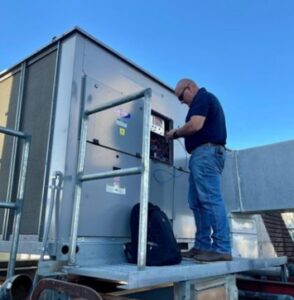It seems impossible to imagine modern life without air conditioners, which shows how much we depend on artificial cooling. But the major problem with air conditioning is its adverse environmental effects.
Continue reading this blog to explore the adverse effects of air conditioners on the environment and tips for minimizing those effects.
Environmental Impacts of Air Conditioners
- The electricity used to power air conditioners adds to the production of greenhouse gases.
- Air conditioners are responsible for global warming, and it’s a serious concern.
- A lot of energy, along with several harmful chemicals and raw materials, is required to produce and dispose of air conditioners, which is also a serious concern.
Therefore, to combat climate change and save the ecosystem, it’s crucial to minimize the environmental impacts of air conditioners. Wasting no more time, let’s find out how to reduce the environmental effects of air conditioning.
How to Reduce the Environmental Impacts of Air Conditioners!
- Use air conditioners with high SEER (Seasonal Energy Efficiency Ratio) ratings because such AC systems are more energy-efficient.
- As each degree below this temperature can increase energy usage by 6 and 8%, set the temperature at 78°F (26°C) or above to make the most of your air conditioner.
- Modern thermostats come equipped with intelligent features to minimize the workload on cooling systems when the user is sleeping or not at home.
- Air filters should be cleaned and changed frequently to keep the air conditioner operating at peak performance.
- Insulate your home and fix air leaks to ease the workload on your air conditioner.
- Use fans to circulate the air and open windows and doors for natural ventilation.
- Consider using other cooling techniques like evaporative coolers, portable fans, and ceiling fans.
Using these suggestions, you may lessen the adverse effects of air conditioners on the environment and save electricity costs.
Key Benefits of Reducing Environmental Impacts of Air Conditioners
Many advantages for both you and the environment can be obtained by reducing the environmental effects of air conditioners.
- Lower Energy Bills: You may use energy-efficient air conditioners to reduce energy consumption and save money on electricity bills.
- Healthy Indoor Environment: Air quality can be improved in your house by limiting the usage of air conditioners, which can eliminate allergens and pollutants indoors.
- Environmental Protection: You may help prevent climate change and conserve the environment by replacing HFCs with safer refrigerants and reducing greenhouse gas emissions.
- Long-term Savings: You can reduce energy costs over time by investing in an energy-efficient air conditioner and taking energy-saving measures.
- Increased Comfort: You may maintain a cool, comfortable house while lowering the environmental impact of air conditioners by adopting natural ventilation and alternative cooling techniques.
You can avail these advantages and help create a more sustainable future by minimizing the environmental effects of air conditioners.
Final Thoughts & Recommendations
Although air conditioners negatively influence the environment, we may lessen this impact by following energy-saving measures and using alternate cooling methods. For example, use natural ventilation, set the temperature at 78°F (26°C), and purchase energy-efficient air conditioners. The primary advantages are lower energy costs, better air quality, and environmental protection.
We can conserve energy and lessen our carbon footprint by reducing the environmental effects of air conditioners. By acting now, let’s build a more sustainable future.
Lastly, ensuring your air conditioner is running well is crucial, and AC Repair Boca Raton specialists can help you with that. Connect with the experts today to fully optimize your AC performance.





More Stories
What Makes Handmade Olive Oil Bar Soaps So Special? A Friendly Guide to Choosing and Gifting Artisan Soap Sets
How Home Inspectors Help You Avoid Costly Mistakes
How to Keep Your AC in Shape? A Friendly Guide to AC Maintenance in Roseville, CA